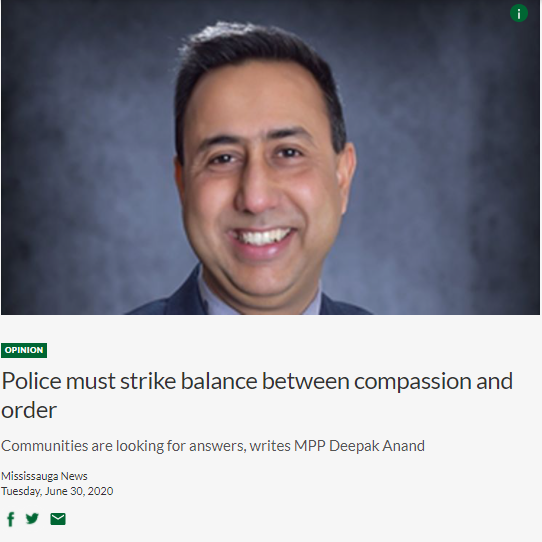POLICE MUST STRIKE BALANCE BETWEEN COMPASSION AND ORDER

On the night of June 20, 62-year-old Ejaz Choudry, suffering from schizophrenia, was shot by the police in his own home in Mississauga. The family had called the paramedics to help the patient, who then called the police. Seven shots were heard and Mr. Choudry was found dead.
Unfortunately, this story has been heard before. This year on April 6, a 26-year-old named D’Andre Campbell was going through a mental crisis and was shot dead by the police in his home in Brampton in a similar manner. The confidence in the police system is shaken and communities are looking for answers as protests have been sparked by these incidents.
This of course is happening in the context of the merciless killing of George Floyd in the U.S., which triggered a series of protests around the world demanding accountability in our law enforcement systems.
People have taken to the streets, despite the coronavirus, to stand up to the questionable behaviour of the police officers involved. These incidents show the need for change in our law enforcement systems and asks the question of whether we have given too much responsibility to the police.
The Peel Police Chief had similar thoughts after the death of Mr. Campbell in which he explained that officers should not be the ones “at the doorstep of individuals in a mental health crisis.”
The system needs to be changed where the police are not to take charge of mental health calls, and if they are the first responders, then they need to be trained to have more compassion for everyone involved and not inadvertently become executioners.
As our systems are grappling with the virus and these deaths, it seems the revolution and subsequent reparations that would be witnessed by Floyd’s “I can’t breathe” is comparable to Martin Luther King Jr.’s “I have a dream.”
Police systems need to strike a balance between compassion and order to carry out their mandate to serve and protect. There is an urgent need for constructive dialogue so that families can call first responders with confidence that they will be helped.